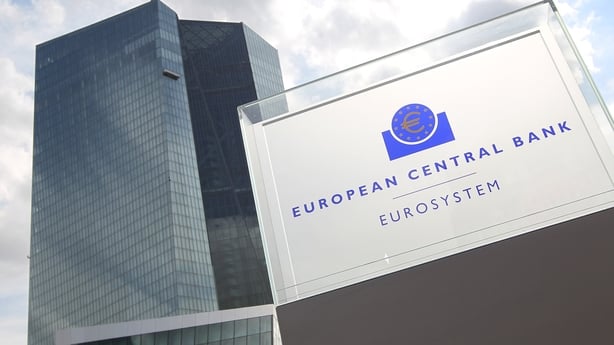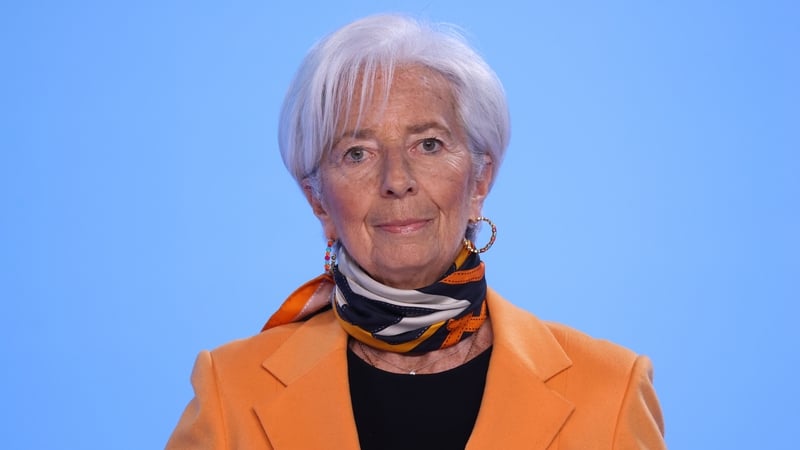The European Central Bank has cut interest rates as expected and kept the door ajar to more, even as a looming trade war with the US and plans to boost military spending drive Europe’s biggest economic policy upheaval in decades.
Easing for the sixth time since June, the ECB lowered its deposit rate to 2.5% in a nod to slowing inflation and faltering growth, and said that rates were still restricting growth, even if less so than in the past.
That wording suggests that more rate cuts may be coming as the central bank has long declared that restriction is no longer necessary once inflation, at 2.4% last month, is safely heading back to its 2% target this year.
“Monetary policy is becoming meaningfully less restrictive,” the ECB said in a statement, changing its previous guidance that rates remained restrictive.
The nuanced language means a further rate cut in April is not a given, with policy hawks already arguing for caution.
We need your consent to load this rte-player contentWe use rte-player to manage extra content that can set cookies on your device and collect data about your activity. Please review their details and accept them to load the content.Manage Preferences
ECB President Christine Lagarde said this latest cut was widely backed, with only Austrian central bank chief Robert Holzmann abstaining.
Ms Lagarde said the ECB would not pre-commit to further moves.
“If the data indicates to us that in order to reach (our) destination, the appropriate monetary policy should be to cut, we shall do so,” she told her regular press conference.
“If, on the other hand, the data indicates that is not the case, then we shall not cut and we will pause.”
Ms Lagarde said the bank was watching how the transformational changes to fiscal rules announced this week by Germany and the European Commission to boost defence and infrastructure spending would play out.
“This is work in progress. We have to be attentive and vigilant, and understand how this will work,” she said. “On both accounts, that would be supportive to European growth at large.”
The ECB lowered its 2025 economic growth forecast, released quarterly, for the fourth consecutive time, putting expansion in 2025 at just 0.9%, only slightly above the 0.7% pace recorded last year.

Inflation was meanwhile seen at 2.3% this year, above the 2.1% seen three months ago. Ms Lagarde nevertheless said disinflation in the euro area remained on track and that inflation was due to hit the target of around 2% by early 2026.
“The downward revisions (in growth) for 2025 and 2026 reflect lower exports and ongoing weakness in investment, in part originating from high trade policy uncertainty as well as broader policy uncertainty,” the ECB’s statement said.
The level of uncertainty in the global economy was something to which Lagarde referred repeatedly in her press conference.
A trade war with the US is looming and firms are already holding back investment, awaiting clarity on measures to be directed at the European Union and how tariffs imposed on others could redirect trade flows.
While more spending is better for growth, it could also add to price pressures, and measures of longer-term inflation have surged from around 2.05% early this week to 2.24% today, an unusually large shift.
But the ECB does not act on short-term volatility so that change will not be enough for now to alter the debate, even if policymakers are likely to notice and raise the issue in the coming weeks.
Good news for tracker customers
Brokers Ireland said the ECB decision will be welcomed by tracker mortgage holders in particular, but not so much by savers.
“Tracker mortgage holders will now be down to 2.65% from the very high point of 4.5% in September 2023,” said Rachel McGovern, Deputy Chief Executive at Brokers Ireland.
“This includes the 0.35% reduction. Tracker mortgage holders, depending on their individual contracts, pay an additional 0.50% to 1.25% on the ECB rate,” she added.
Ms McGovern said beyond tracker mortgage holders, those on variable rates and those coming off fixed rates are dependent upon what their lenders will do.
“About eight in every ten new mortgages taken out in recent years were for fixed terms, short fixed terms, typically three years. And about 80,000 of these are exiting those rates this year,” she said.
“With falling rates and a bit more competition in the market their worst fears will have eased,” she added.




